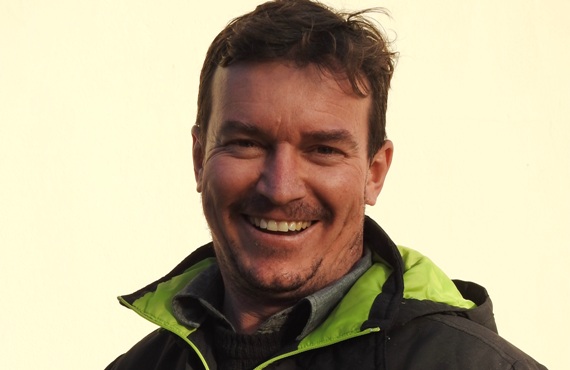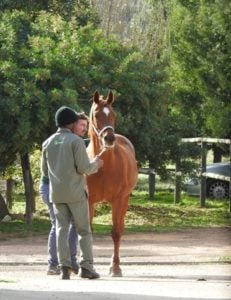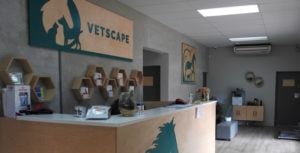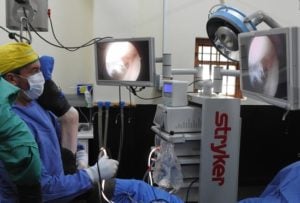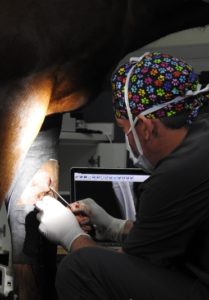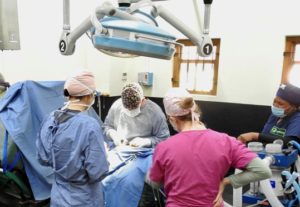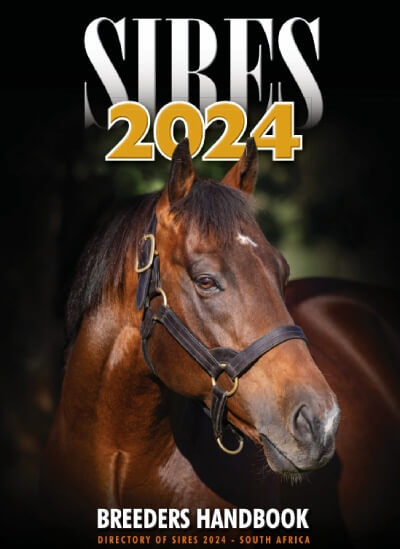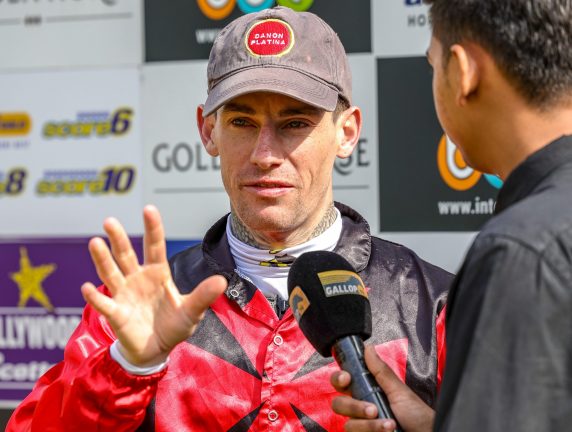They say if God wants to punish you, he makes you love animals. I suspect he reserves a special category for horse people, because the second you acquire one, they seem to spend all their time trying to get to heaven (or possibly elsewhere, if you own a pony). Guarding the threshold are our vets.
Dr Andrew Gray has held the line for my horses more often than I can count, and I should probably add a disclaimer that he walks on water as far as I’m concerned.
If the name doesn’t ring an immediate bell, it’s probably because Andrew is best-known where it counts – under the theatre lights of Vetscape Referrals Equine.
More than trusting him with my life, I trust him with my horses’, which is the highest compliment I can afford anyone. It therefore gives me enormous pleasure to congratulate him on qualifying as a Diplomat of the European College of Veterinary Surgeons. It is one of the toughest and most prestigious veterinary surgery qualifications in the world and Andrew is the first South African to hold this distinction.
About Andrew
If it is possible to be born into the profession, then Andrew comes close. His mother was an Irish farmer’s daughter and farm life, with neighbours who were masters of the hunt, had a big impact. Both Andrew’s uncle and older cousin are vets, and he says he was always ‘that guy’ who did a lot of work at the local vet. “I worked with my uncle and cousin and never imagined I’d do anything else.”
With its notoriously stringent admissions requirements, Onderstepoort is no walk in the park, but Andrew describes his experience as a time when you worked hard, played hard, had a lot of fun and crammed as much as possible into a short space of time. In addition to life-long friends, he graduated in 2002 with a passion for surgery.
CV
Andrew started out as an emergency vet at the Cape Animal Medical Centre in Kenilworth performing surgery on dogs, cats and whatever else he could – including somewhat famously, a tortoise that lost its hind leg. Andrew substituted a model aeroplane wheel to help it get around and even made the papers! Assisting a Khayelitsha welfare organisation every week was invaluable for learning to make do with limited resources.
A chance meeting with well-known racing vet Dr Vere Allin proved a turning point. Vere needed a younger assistant, Andrew was tired of the night job and decided to accept, receiving a crash course in horses and the racing industry into the bargain. It stood him in good stead when he spent an intensive two years in Australia working with horses. “There are limited staff in those hospitals, so you feed, handle, inject, drive, do everything yourself. I learnt a lot,” he says gratefully. He started doing more surgery and got to try his hand at everything you can do without specialising.
Back in South Africa, he joined a practice in Plett focussing on wildlife, a strong side passion which Andrew pursues whenever he can. The next major turning point was meeting Dr Ian Heyns, who was looking for someone to help grow Drakenstein Veterinary Centre (DVC) in Franschhoek. Andrew remembers, “I joined when we were still working out of Wellington Animal Hospital. I think we did the first surgery here in December 2008 and I’ve been here ever since.”
DVC
DVC was born out of the need for a specialist equine facility for the increasing investment in bloodstock in the country. The available equine hospitals were able to do a certain level of work, but unable to cope with the growing demand of the breeding industry in particular. Recognising this, stakeholders such as Gaynor Rupert, Mary Slack, Andreas Jacobs, Graham Beck and Markus Jooste provided funding for the development of a state of the art veterinary hospital while Ian Heyns structured the business to cater to the industry as well as the needs of surrounding veterinary practices.
Changing Relationship
When DVC was restructured in 2019 and rebranded as Vetscape it expanded to include a small animal specialist facility. “We’ve got two small animal specialists and we worked hard to get it off the ground, now it’s flying,” adds Andrew. “It’s separate to the equine business, but we try and have a synergy where we feed off each other and share equipment.”
It continues the hospital’s collaborative approach and it has long been a centre for shared knowledge and experience, working closely with complementary disciplines such as physiotherapists and farriers in particular. Andrew continues, “Prof Sybrand van der Berg was my first equine surgery mentor. He was a strong ambassador for the relationship between farrier and vet and sparked my interest in farriery, but there is a mind-shift happening out there and the relationship with clients has changed significantly. Rather than just doing colics and stitching, vets are now part of a support network and work as a team with farriers, EDT’s and holistic practitioners to keep horses healthy. Where people used to bring you a lame horse, they have realised that regular checkups can address small issues before they become big issues, so we now get sound horses who just need small adjustments to stay healthy. It’s more prophylactic, but if you can do more proactive work, you end up doing less reactive work.”
Industrial medicine
Thanks to the sheer size of the animal, the challenges facing equine surgeons are on a vastly different scale to those operating on small animals or even humans and everything is multiplied – the risks, the logistics of handling something that weighs half a ton, and even the amount of medication – on a kg for kg dose, a horse will need 10 times more medication than a human, so what costs R250 for us will cost R2,500 for a horse.
“It’s industrial medicine,” concurs Andrew. “With horses it’s a challenge. Because they are such large animals, everything is a challenge. If a horse can find a problem, they will find it. Horse surgery is in a class of its own with regards to the odds of successful recovery. There will be times you think everything is fine and then they will make your life hell, but it’s rewarding to see them walk out of the door at the end of the day.”
To ensure as many walk out of the door as possible, the hospital has two fully equipped equine theatres, state of the art endoscopic and arthroscopic equipment, an overhead large X-ray unit and several small mobile ones and a scintigraphy machine, invaluable for detecting stress fractures. There is also an isolation facility, a high speed treadmill and a rehabilitation horse walker.
Why Surgery?
“You get to see results at the end of the day and these days there are surgical interventions that can save a horse from being put down,” he explains. “We are still pushing the limits on some big long bone catastrophic fractures, but thanks to surgical advances there are some fractures that can be successfully treated and allow horses to go on to have useful lives. Some go on to win races, jump and event at high levels, so it’s not just salvage – it allows you a functional animal.”
Qualification
Andrew joined the European College of Veterinary Surgeons (ECVS) thanks to Professor Olivier Lepage, a specialist equine surgeon, Board Certified by the European College of Veterinary Surgeons. As head of the Equine Department at the Veterinary Campus of the University of Lyon, Prof Lepage lectured at the 30th World Veterinary Congress in Cape Town in 2010 and enjoyed it so much he chose to take a sabbatical here to expose his 5 children to a different culture. It proved serendipitous. Professor Lepage was experienced in equine cervical arthrodesis and when Jet Master presented with wobbler symptoms, Prof Lepage along with the ‘Seattle Slew’ team, was on hand to mentor Andrew when this procedure was first performed in South Africa in 2011.
Prof Lepage tailored a programme for Andrew at the University of Lyon, but there were a number of challenges. While most of the academic component could be done on line, Andrew needed to spend a few months in Lyon every year. Although the hospital had a sufficient case load for the practical component to be done locally, the ECVS credential committee required the hospital to be registered and certified as an ECVS facility, making it equal to the most stringent European standards. But bit by bit, it all got done.
The exam, like the entry requirements, is stringent. Held once a year in February, it is sat in Zurich, and has a pass rate of around 25%. Andrew tried his hand for the first time in 2018. Unfortunately, February is one of the busiest periods for the hospital and Andrew had an extra busy case load, as well as overseeing the business restructure, but still passed 2 of the 3 components.
In 2021, Covid caused the exam to be postponed to July and with the travel ban preventing Andrew from leaving the country, it was arranged for him to write at Onderstepoort under the adjudication of two European diplomat surgeons. He was able to sit it in real time at the time as all the other candidates. “It was very well organised,” he says.
Then followed the nail-biting wait until and he received his pass result 10 days later. “Then I actually was finished! My back was sore, I had a chronic headache for a week – I was actually physically debilitated from studying, but to get through was a wonderful relief.”
What does it mean?
“I’m qualified as a Large Animal European Certified Specialist Surgeon,” explains Andrew. “I had to study cows and sheep and goats, so had to endure the pain of those text books, and have qualifications I may never use,” he laughs ruefully.
“But with regards to horses, I’ve been evaluated both on a practical as well as theoretical level on the most up to date surgical procedures. I had to read over 800 articles and text books, so we are 100% current on what’s available, what does and doesn’t work and the best means to go about a surgical or medical problem at a specialist level.”
“We also have more direct knowledge on regenerative medicine and where to apply technologies such as PRP (platelet rich plasma), IRAP (Interleukin-1 Receptor Antagonist Protein) and stem cell treatment, which represent a new frontier in equine therapy. It does have merit in certain specific applications, but you can’t just blanket medicate everything.”
Something Andrew is particularly enthused about is standing surgery. “A lot of procedures which once required general anaesthetic can now be done standing, thanks to lasers and specialised prostheses. When we do a tie back, the horse walks back into his stable when we’re done. Some fracture repairs that used to be done on a table can now be done standing – you put a cast on and the horse doesn’t have the stress of the recovery process. That’s a huge step in my mind,” he enthuses.
“Minimally invasive surgery is the other area I promote to the end of time. You can perform procedures through natural body orifices and using much smaller incisions which really aids recovery time. We do lot of arthroscopy, laparoscopy and remove tumours with keyhole surgery, and a lot of those procedures are done standing now. So much so, that we’re planning to build a standing theatre.”
Thanks
To have an internationally qualified surgeon and facility of this nature is a huge boost for South Africa, but if it takes a village to raise a child, it requires a small army for an achievement of this magnitude.
“The main thing about this journey is that it’s really been a huge group effort,” acknowledges Andrew gratefully. “Typically what happens is a vet goes to university where they cater for doing the residency and academic side and the environment allows someone to become a specialist, but I’m not your typical A-type surgeon personality. Due to my commitments at the practice, I definitely would not have been able to go to university full-time, so I’ve done the alternate track programme. I’ve had to create an environment equal to university while running the practice and having a family, so it’s been a huge juggling act, but it’s the only way I could have done it.”
“I’ve had a helluva lot of help and support. To Gaynor and Mary and all the funders – we could not have done it without their support and vision to build this hospital. Then the support of all the farm managers and trainers and all the people who trusted me with their horses.”
“One of the biggest supporters of the whole idea was Ian Heyns. He is a visionary guy and embraced the idea of the qualification and DVC and the business helped fund me and the research projects.”
“I have to say a huge thank you to Prof Lepage for dedicating his time specifically to me to ensure I could fulfil the requirements.”
“To all my colleagues, especially Pia Russmussen and Sonia Marcos Serralta who helped me get through all the paperwork, but all the vets I work with have been very supportive in helping me get through the daily grind as well as all the additional work to get this done.”
“And most importantly, my wife and family have been amazing and had to sacrifice a lot. You have to dedicate a lot of time to get through the material as well as the practical work. Tacita supported me 100% and has been a pillar of strength the whole way. My kids had times where they’ve had to take second place to me trying to do everything I needed. I missed our second daughter’s birth because I was trying to get a plane back from France after the exam, but I am eternally blessed to have had all these opportunities. I have a chaotic life, but I love it and would never change it for anything.”
“More than anything, I’m grateful to all the people that helped me get here.”
Where To Next?
They say the reward for good work done is more of the same and Andrew’s enthusiasm is as strong as ever. “We have already published several papers, Pia Rasmussen managed to pursue and complete her residency and we currently have a new full-time medicine resident. We’ve developed a relationship with Lyon University and enrolled with the European College of Internal Medicine as well as the European College of Surgery. Although we sadly lost Pia to the UK, we have now employed Catriona Lyle who is a highly qualified European specialist in internal medicine and is the direct supervisor to our resident, Emily Leus. Emily is doing a practice based residency which she will complete in 3 years and will qualify as European Internal Medicine specialist.”
“I would like to continue to develop the hospital with new equipment, but the grand plan is for me to take on my own resident and train my own specialist resident surgeon out of Vetscape.”
They say a good surgeon knows when to operate, a great surgeon knows when not to. How lucky we are to have Dr Gray and his Vetscape team.


